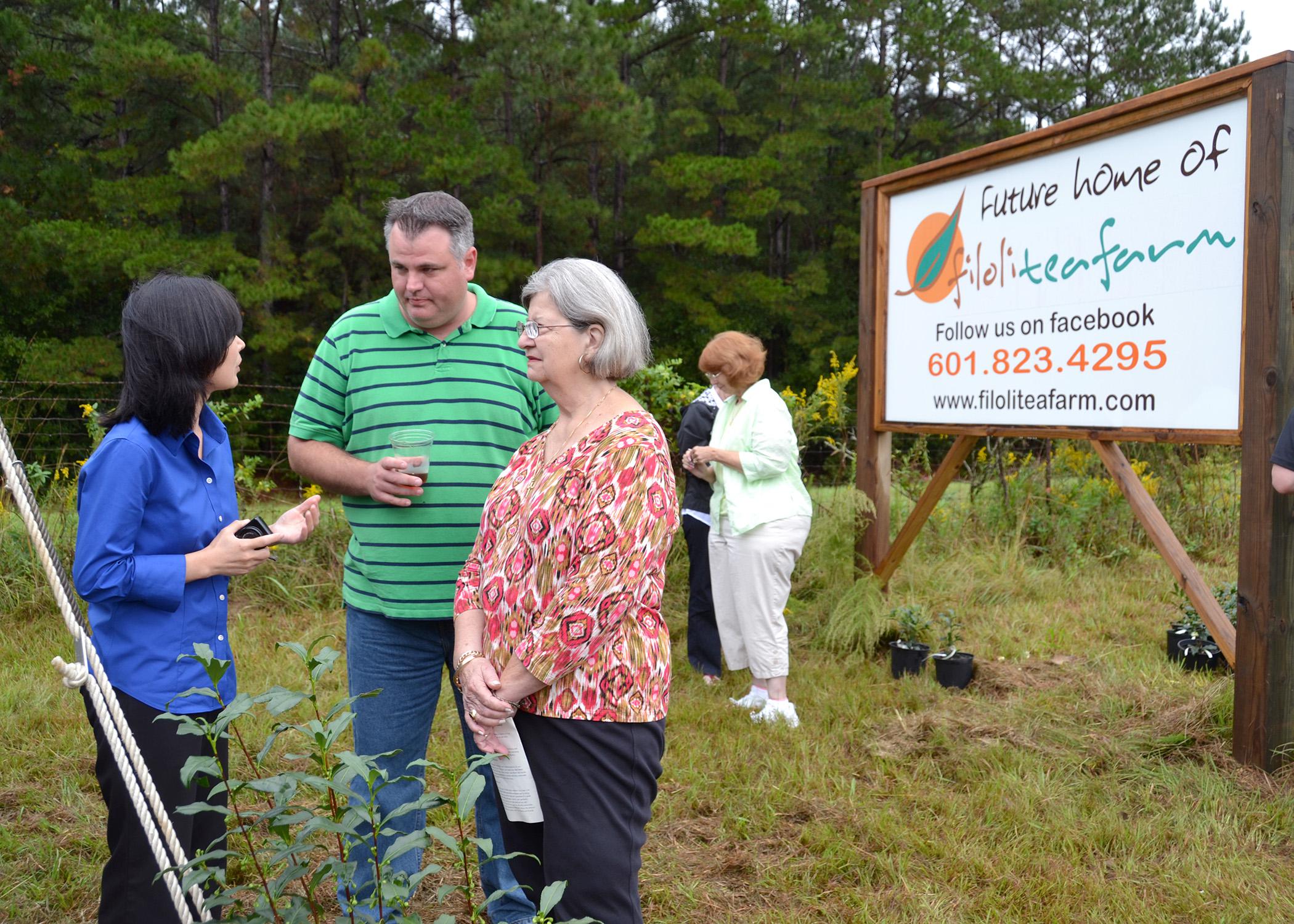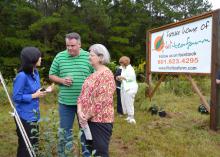Information Possibly Outdated
The information presented on this page was originally released on October 17, 2013. It may not be outdated, but please search our site for more current information. If you plan to quote or reference this information in a publication, please check with the Extension specialist or author before proceeding.
Tree farmer starts first tea farm in Mississippi
BROOKHAVEN – When Hurricane Katrina destroyed his timber stand in 2005, Lincoln County landowner Jason McDonald searched for an alternative crop.
In May 2012, he visited the Charleston Tea Plantation in South Carolina and began to consider growing the crop himself.
“I wanted something that was sustainable and better at resisting storm damage,” McDonald said. “As long as tea plants are managed well, they are low-growing, which makes them able to survive high winds.”
After five months of in-depth research, he and his business partner, Timothy Gipson, decided they would give tea a shot. For expert help in the venture, they went to their Mississippi State University Extension Service office.
“They came in and said, ‘We want to grow tea. Will you help us?’” said Lincoln County Extension coordinator Rebecca Bates. “I thought, ‘What a breath of fresh air. Somebody wants to grow tea. That’s something new and different.’”
Tea has never been grown commercially in Mississippi, but the state’s climate and soil are well-suited to the plant, Bates said.
“Tea needs high humidity and acidic soil to thrive, both of which we have here,” Bates said. “Tea comes from a type of camellia, Camellia sinensis. We grow lots of camellias in Mississippi and in Lincoln County.”
Bates pulled together a team of MSU specialists to help McDonald study the possible effects of insects, diseases, soil conditions and climate on tea plants. McDonald also enlisted Nigel Melican of Teacraft Ltd., to evaluate the farm’s suitability to grow tea. Melican is an experienced tea-growing consultant based in the United Kingdom, who has successfully produced tea in 26 countries and on six continents. He has advised tea growers in Hawaii, Alabama and South Carolina.
The planting of 250 one-gallon and 10 three-gallon tea plants planned for the Oct. 17 groundbreaking of FiLoLi Tea Farm’s first 14 acres was delayed by rainy weather.
“We have water standing in the holes after the rain, and we need to be able to mix fertilizer into the soil before planting,” McDonald said. “We should be able to get them in the ground in a few days.”
McDonald, Melican and Mississippi Commissioner of Agriculture and Commerce Cindy Hyde-Smith planted one ceremonial tea plant for visitors. The rain hindered planting but not the enthusiasm surrounding the endeavor.
“We are so excited for Jason and everyone involved,” said Lincoln County Master Gardener Shirley Estes. “We’ve grown camellias here for their beauty for years, and we know they will grow well. We could not be more pleased to have the addition of camellias for tea.”
In May, the owners will add an additional 60,000 tea plants.
McDonald and Gipson plan to expand the farm to 150 acres by 2020. Each acre can support 5,000 plants.
The pair plans to begin with a line of black tea, which is the most commonly consumed tea in the United States, McDonald said. Eventually, they will add different teas, such as green tea, if the black tea does well.
“Our goal is to make as many different teas as possible,” McDonald said. “All tea comes from the same bush. The differences in teas happen during processing.”
Mechanized harvest of the first plants planted will begin in 2016, once the tea crop reaches maturity. McDonald plans to process the tea in Mississippi and should have a facility in place by the first harvest.
They plan to market the tea online and through wholesale markets and later in an on-farm gift shop.
“The tea farm will also be an agritourism venue, where visitors can tour the farm and the processing facility,” McDonald said. “They will be able to see the entire process from start to finish. People are interested in knowing where their food comes from.”
Interest in the farm is high.
“I don’t know of any project in the state that has intrigued more people than the tea farm,” said Hyde-Smith. “But it’s a no-brainer if you think about the fact that Mississippi’s No. 1 industry is agriculture and that almost everyone drinks tea. I am happy to be exposed to the energy and enthusiasm Jason and everyone involved has for this project.”






